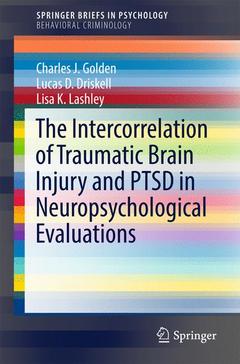Description
The Intercorrelation of Traumatic Brain Injury and PTSD in Neuropsychological Evaluations, 1st ed. 2016
SpringerBriefs in Behavioral Criminology Series
Authors: Golden Charles J., Driskell Lucas D., K. Lashley Lisa
Language: English
Subject for The Intercorrelation of Traumatic Brain Injury and PTSD...:
52.74 €
In Print (Delivery period: 15 days).
Add to cartSupport: Print on demand
Description
/li>Contents
/li>Biography
/li>Comment
/li>
This concise reference clarifies the gray areas between traumatic brain injury and PTSD while providing an empirically sound framework for neuropsychological evaluation and differential diagnosis. Its extended research review summarizes findings on key topics including the neuroanatomy of brain injury, test battery design and selection, and the salience of accurate diagnosis to ensuring appropriate specialized treatment. The authors offer the possibility of combined diagnosis as well as injuries that may fall through the diagnostic cracks, and consider possible relationships between TBI, PTSD, and the dementias, including Alzheimer?s disease. This knowledge base and the practical guidelines it informs are presented so that readers can better:
· Understand the clinical distinctions between TBI and PTSD, and among forms of TBI.
· Recognize cognitive, behavioral, emotional, and social components of the disorders.
· Identify skill areas for neuropsychological evaluation of patients.
· Select appropriate instruments for individualized assessment.· Address test administration and interpretation concerns.
· Make an accurate differential diagnosis between PTSD and TBI.
With its sharp focus on the nuances of trauma and recovery, The Intercorrelation of Traumatic Brain Injury and PTSD in Neuropsychological Evaluations will find a wide, interested audience among psychologists, neuropsychologists, neurologists, psychiatrists, social workers, mental health counselors, undergraduate and graduate level students, and researchers. In addition, this text may be useful for those interested in psychology and neurology.
<
Charles J. Golden, Ph.D., ABPP, ABCN, ABPN, ABAP
Professor
Director, Neuropsychology and Psychology Assessment Centers
Expertise
Neuropsychological and psychological assessment and evaluation. Forensic psychological evaluation. Aggression and violence related to brain function. Learning disabilities and hyperactivity.
Background
He is nationally and internationally known for his clinical research in the field of neuropsychological and psychological assessment. He has given over 100 invited presentations/workshops, and published over 500 articles, book chapters, books. He is a Fellow in the American Psychological Association (APA), and holds a Diplomate in Clinical Psychology, Clinical Neuropsychology, and Psychological Assessment. In recognition of his clinical and research accomplishments, he has received the Distinguished Neuropsychologist Award from the National Association of Neuropsychologists in 2003. He has been a journal editor and currently is a peer reviewer for multiple professional journals. He is a past president of the National Academy of Neuropsychology.
Lisa K. Lashley, Psy.D.
Assistant Professor
Assistant Director, Neuropsychology and Psychology Assessment Center
Expertise
Neuropsychological and psychological assessment and evaluation. Sports concussion, learning disabilities, brain injury, attention disorders.
A concise and research informed explanation of TBI and PTSD is offered
TBI and PTSD in other populations than military, such as survivors of car wrecks, are discussed
Creating a neuropsychological battery for TBI and PTSD is discussed
Interpreting and differentiating between PTSD and TBI with neuropsychological data is covered
Includes supplementary material: sn.pub/extras




